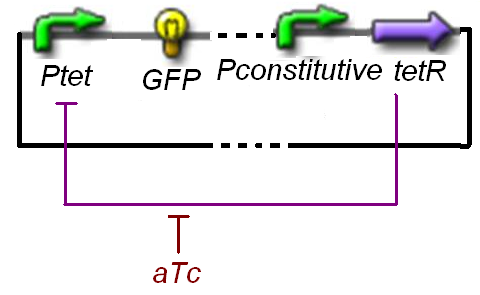Team:Paris/Modeling/f1
From 2008.igem.org
(Difference between revisions)
| Line 4: | Line 4: | ||
To deduce from our measurements the correct hill function, see the [[Team:Paris/Modeling/estimation#how_to_control_the_concentration_of_the_transcription_factor_.3F|different methods]]. | To deduce from our measurements the correct hill function, see the [[Team:Paris/Modeling/estimation#how_to_control_the_concentration_of_the_transcription_factor_.3F|different methods]]. | ||
| - | The best one consist in finding in the literature the dissociation constant of the reaction aTc + TetR⇄ aTc_TetR, in order to determine by calculus the amount of free TetR, function of the expression of a known constitutive promoter before ''tetR'' and of the added aTc. In this way, we just have to study [expr.''Ptet''] = ƒ | + | The best one consist in finding in the literature the dissociation constant of the reaction aTc + TetR⇄ aTc_TetR, in order to determine by calculus the amount of free TetR, function of the expression of a known constitutive promoter before ''tetR'' and of the added aTc. In this way, we just have to study [expr.''Ptet''] = ƒ1bis(TetR<sub>free</sub>). |
Revision as of 15:10, 13 August 2008
No particular strain.
To deduce from our measurements the correct hill function, see the different methods. The best one consist in finding in the literature the dissociation constant of the reaction aTc + TetR⇄ aTc_TetR, in order to determine by calculus the amount of free TetR, function of the expression of a known constitutive promoter before tetR and of the added aTc. In this way, we just have to study [expr.Ptet] = ƒ1bis(TetRfree).
 "
"
